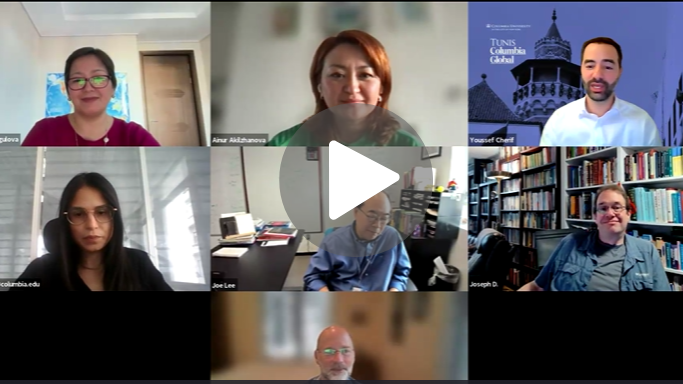LRHG - Lecture 24: Kazakhstani Reference Genome, Kazakhstani Reference Microbiome : Challenges and Application in Clinical Practice
For the 24th lecture from the Logical Reasoning in Human Genetics series, an ongoing collaboration with Institut Pasteur de Tunis, we delved into the genetic landscape of Central Asia for the first time. Our guest speakers, Dr. Ainur Akilzhanova, Acting Director at the Center for Life Sciences, National Laboratory Astana at Nazarbayev University, Kazakhstan, and Dr. Kushugulova Almagul, Leading Researcher at the Life Sciences Center, National Laboratory Astana, shed light on the unique genetic makeup of the Kazakh population. Shaped by centuries of nomadic lifestyle and migration, the Kazakh people exhibit a blend of Western and Asian genetic traits, necessitating a deeper investigation into their genetic background to understand prevalent diseases and distinctive characteristics.
Since 2012, the Center for Life Sciences at the National Laboratory Astana has been pioneering genomic research, utilizing next-generation sequencing (NGS) technology to decode the entire human genome. Their findings reveal significant genetic diversity within the Kazakh population at the genomic level. To comprehensively grasp the Kazakh population's genetic architecture, large-scale genome research utilizing both short read sequencing (NGS) and long read sequencing (third-generation sequencing - TGS) is crucial.
A pivotal step towards advancing personalized medicine in Kazakhstan involves establishing a comprehensive genomic database of the population. This entails enhancing scientific capabilities to conduct studies, accurately sequence and genotype genomes, diagnose conditions, and analyze vast arrays of genomic data. By identifying millions of genetic variants across the Kazakh genome and fostering international collaborations, the team aims to refine genetic risk profiles for diseases like cancer and cardiovascular conditions.
Furthermore, the initiative seeks to create a reference Kazakh Genome through sequencing of individuals' entire genomes using various sequencing platforms. This comprehensive approach is poised to enhance medical interventions tailored to the Kazakh population's genetic makeup.
The webinar also discussed the Kazakhstani Reference Microbiome, emphasizing the intricate interplay between environmental factors, lifestyle choices, and gut microbiota and how understanding these dynamics is crucial for developing targeted interventions to restore and maintain a healthy microbial ecosystem within the population, ultimately promoting overall health and well-being.
To learn more about the progress made in understanding the genetic and microbial characteristics of the Kazakh population, watch the full recording here.
The LRHG series is in partnership with Institut Pasteur de Tunis - معهد باستور تونس. You can join us every first Wednesday of the month for a new and enlightening lecture.
More information on the course and recordings of the previous lectures can be found here.
-
Lecture 22 - Lessons to Remember from Lactase Deficiency - Lactase Persistance Projects
-
Lecture 20 - Cultural Perspectives on Autism Spectrum Disorder in Africa
-
Lecture 19 - The Monogenic Architecture of Retinal and Neurological Diseases
-
Lecture 18 - Variability in Biological Systems: Study of 24-h Blood Pressure Monitoring
-
Lecture 17 - Exploring the oral microbiota by metagenomics approach: from Bacteria to Archaea
-
Lecture 16 - A multi-disciplinary examination of Alzheimer Disease in extreme samples
-
Lecture 15 - Novel genomic variants and genetic factors involved in Disorders of Sexual Development
-
Lecture 13: Introductory class and the latest research in Human Genetics
-
Lecture 11 - The Ins and Outs of Sustaining Longitudinal Cohort for Genetic Studies
